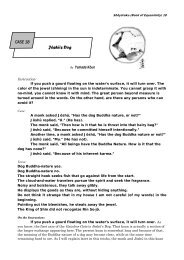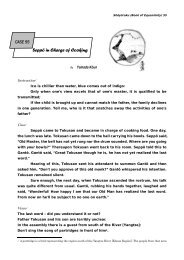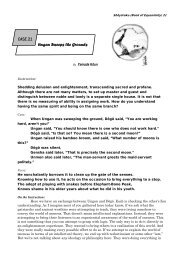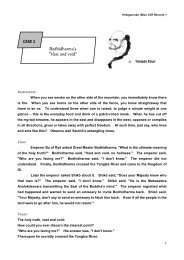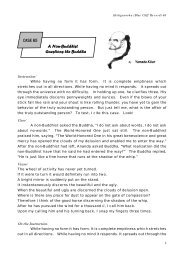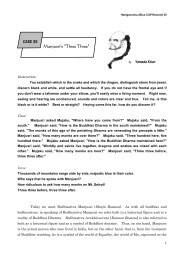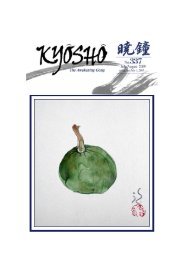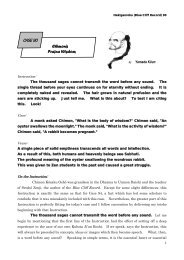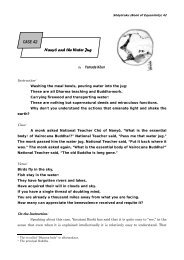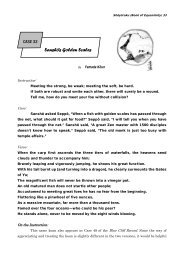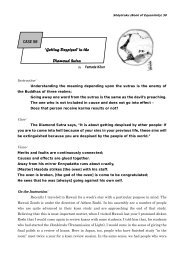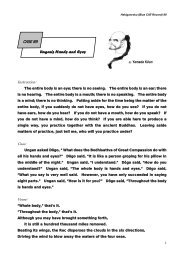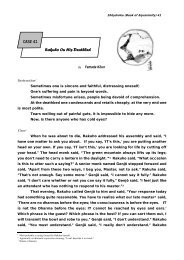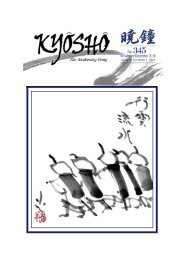Shoyoroku 69
Shoyoroku 69
Shoyoroku 69
You also want an ePaper? Increase the reach of your titles
YUMPU automatically turns print PDFs into web optimized ePapers that Google loves.
Shôyôroku (Book of Equanimity) <strong>69</strong>kensho and realized your own essential nature. As long as there is something like “essentialnature” in your head, it is still not the genuine article. If you have truly become one with it, youare not aware of it in the least. As long as there is an awareness of something like “essentialnature” it is not yet the real thing. To be sure, you must realize some time the essential world.But then you must gradually sweep away all traces of it so that any traces of enlightenmentdisappear. It’s a matter of extinguishing the light. Any consciousness of enlightenment orsomething special must disappear. Yôka Daishi in his Shôdôka (Song of Realizing the Way)refers to this as the “leisurely person of the Way, who has exhausted learning and has nothingto do” (Japanese: zetsugaku mui no kandônin). There is nothing more to learn. But when youhave “nothing to do” (mui, Chinese: wu-wei), it doesn’t mean you just sit around idly. On thecontrary, you devote yourself fully to the task of saving others. Just because you may have hadan enlightenment experience, it certainly won’t do to take a smug attitude. To have completelyforgotten that “there is such a thing” means that any consciousness of a separate egodisappears completely. So long as there is still egoistic consciousness (Japanese: ga), whateveryou do it will still not be enough. If that egoistic consciousness disappears, whatever you do itwill be without error. This is the position expressed in today’s koan. The Buddhas of the threeworlds do not know anything. There is the Japanese expression imo no nieta mo gozonji naiwhich literally means “not knowing whether the yams have cooked or not,” but is used todesignate someone “who doesn’t have a clue.” This originally appears in the so-calledIroha-Garuta 3 . In connection with today’s case, it means that the Buddhas do not realize at allthat the yams are cooked and ready to eat. It’s surprisingly difficult to reach this state. Theremight be some people who steam the potatoes and are fussing about when they’re finally done.But the Buddha doesn’t know a thing about that. “Only the cats and oxen know that there is.”As I mentioned already in reference to the Instruction, the Sino-Japanese expressions “rinu”and “byakko” are translated here as “cats and oxen.” But Hioki Mokusen Zenji says that “rinu”means a raccoon dog (Japanese: tanuki), while “byakko” means a fox. It probably doesn’t makemuch difference how they’re translated, since it’s referring basically to animals. It’s theanimals that know about such things, he says. What does this mean? It means people who stufftheir heads with concepts such as Zen Buddhism and attempt to understand thingsintellectually. Such persons are referred to as “cats and oxen.” He is saying that such concernsare the domain of ordinary, unenlightened persons (bonpu), that it’s such persons who knowabout such matters. When Dôgen Zenji was still young, he happened upon the followingpassage in a sutra: “All beings in essence have true dharma nature, are originally a body ofBuddha nature.” This is basically the same thing as saying, “All beings are intrinsicallyBuddha.” To say that all beings in essence have true dharma nature means that we are perfectand lacking nothing. Upon reading this passage from the sutra, Dôgen pondered: “All human3 Iroha Garuta is a card game for children, similar to Uta-garuta and Hyakuin Isshu. Representing the 47 syllablesof the iroha syllabary and adds kyo ("capital") for the 48th (since the syllable “n” can never start any word or phrase).A set consists of 48 proverbs each starting with a different syllable and another set of cards expressing a proverb.6



